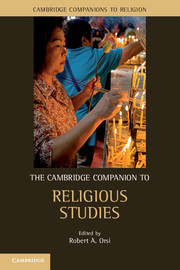Book contents
- Frontmatter
- Introduction
- Part one Religion and religious studies: the irony of inheritance
- 1 On sympathy, suspicion, and studying religion: historical reflections on a doubled inheritance
- 2 Thinking about religion, belief, and politics
- 3 Special things as building blocks of religions
- 4 The problem of the holy
- Part two Major theoretical problems
- Part three Methodological variations
- Index
2 - Thinking about religion, belief, and politics
from Part one - Religion and religious studies: the irony of inheritance
Published online by Cambridge University Press: 28 March 2012
- Frontmatter
- Introduction
- Part one Religion and religious studies: the irony of inheritance
- 1 On sympathy, suspicion, and studying religion: historical reflections on a doubled inheritance
- 2 Thinking about religion, belief, and politics
- 3 Special things as building blocks of religions
- 4 The problem of the holy
- Part two Major theoretical problems
- Part three Methodological variations
- Index
Summary
Since the closing decade of the millennium, social friction generated by the presence of substantial numbers of Muslim immigrants in Europe, as well as the threat of Muslim terrorists, has given a new impetus to the fear of politicized religion. Violent and intolerant “Fundamentalist movements “ have emerged not only in the Muslim world (although these are the most frightening in the West) but also in Israel and the United States. The secular values of liberal democracy are under siege – or so the Western media tell us. Academics who teach religious studies have responded eagerly, seeing in this an opportunity to demonstrate the public relevance of their expertise. What is to be done about the dangers of religious belief to liberal democracies?
More generally one may ask: What are the relations between the secular promise of liberal democracy and the conditions for private belief in transcendence? There is no simple answer to this question, of course, because modern religion has both hindered and aided liberal values and because liberal values are more contradictory and ambiguous than is sometimes acknowledged. But I want to begin with other questions: What is “religion”? How has it come to be defined in the ways it has? What are some of the political consequences of making belief central to the definition?
- Type
- Chapter
- Information
- The Cambridge Companion to Religious Studies , pp. 36 - 57Publisher: Cambridge University PressPrint publication year: 2011
- 18
- Cited by



